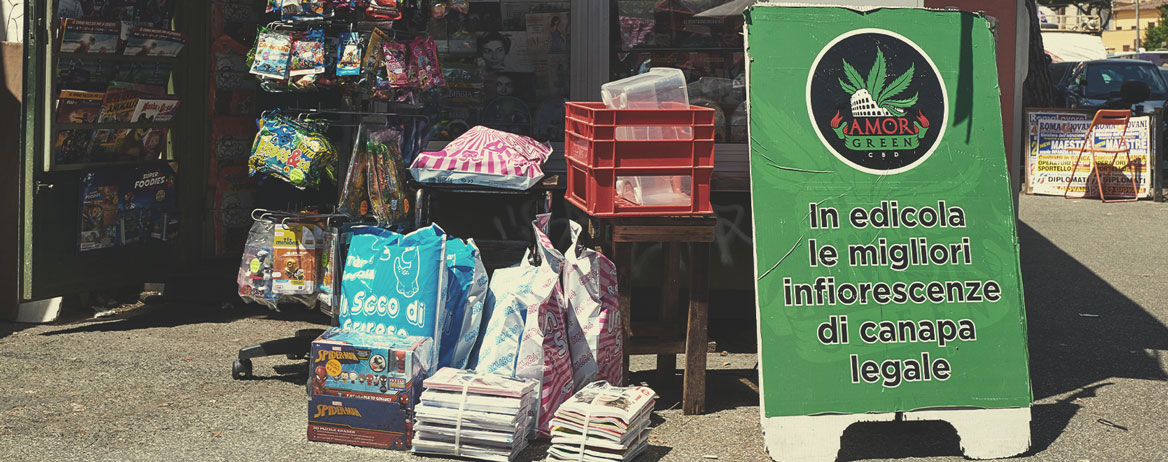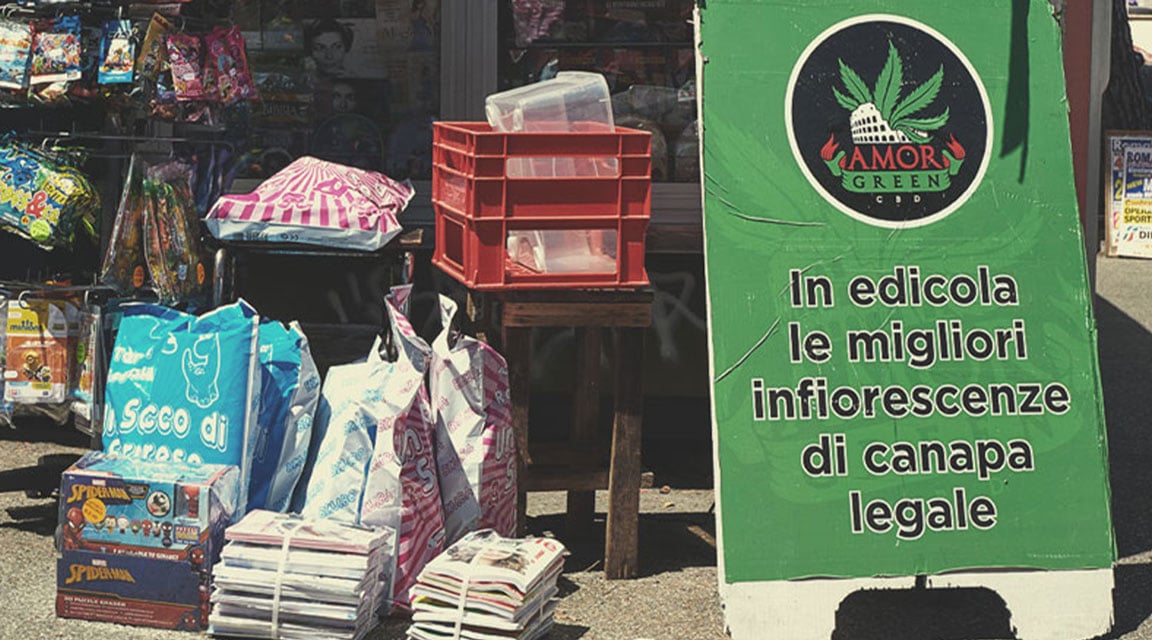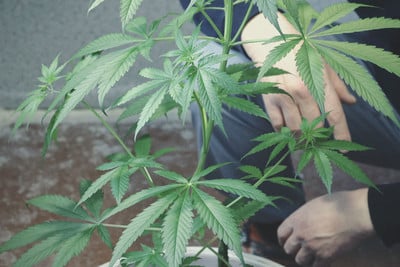.

Medical and Recreational Cannabis Reform in Italy
Italy has an interesting relationship with cannabis, to say the least. The county legalized the herb for certain medical conditions in 2013. Since then, the army has been growing copious amounts of weed in a pharmaceutical facility. Now, the public have the chance to decriminalise both possession and cultivation in a referendum poised for 2022.
Contents:
Italy stands on the cusp of cannabis decriminalisation. Activists within the nation have campaigned for more liberal laws in the past, but with little success. Now, an alliance of pro-cannabis organizations and political parties have launched a ballot initiative to decriminalise personal cultivation and end fines for personal use. This alliance is also working directly on a decree that could change the fining system for minor offenses.
Referendum Cannabis Legale aims to amend certain articles of narcotics law that uphold the punishment for these practices.[1] These alterations won’t legalise recreational cannabis, but they’ll make life much easier for the millions of individuals that grow and smoke the herb within the country’s borders. If successful, the referendum will create the following key changes:
| Less severe punishments | A minor offense will be introduced for less serious cases of production and dealing. |
| Cultivation | The referendum will decriminalise the cultivation of up to four cannabis plants. |
| Support for the vulnerable | Instead of serving prison terms, drug “addicts” will instead receive employment at a socially useful job. |
| Increased criminal penalties | Harsher punishments will be assigned for drug offenses involving minors and breaches of medical and research authorizations. |
| Less severe punishments |
|
A minor offense will be introduced for less serious cases of production and dealing. |
| Cultivation |
|
The referendum will decriminalise the cultivation of up to four cannabis plants. |
| Support for the vulnerable |
|
Instead of serving prison terms, drug “addicts” will instead receive employment at a socially useful job. |
| Increased criminal penalties |
|
Harsher punishments will be assigned for drug offenses involving minors and breaches of medical and research authorizations. |
Understanding Cannabis Reform in Italy
In accordance with Italian law, Referendum Cannabis Legale[2] needed to obtain 500,000 digital signatures by the end of September 2021 to proceed with the ballot campaign. The stars aligned, and the petition gained over 630,000 signatures. Several factors made this effort an overwhelming success. For one, around six million Italians currently use cannabis recreationally, and a recent poll showed that 47.8% of the population are in favor of the legalisation of soft drugs.[3]
The adoption of a digitised ballot system several weeks before the campaign also contributed to the resounding success; in the past, citizens had to sign petitions in person.
This huge public backing means Italians will get the chance to vote “Yes” or “No” in a referendum that will likely take place in 2022.[4] Citizens won’t only have the opportunity to edge the country closer to cannabis legalization, but they’ll get to cast a vote that will help to deflate the crime-riddled black market that currently rakes in billions of euros from trafficking cannabis.
Political Opposition and Hurdles
Despite the optimism, a political rift exists that could stifle the move toward decriminalisation. Members of the Lega and Fratelli d’Italia parties oppose the movement, calling it a “prelude to legalisation” that would “inevitably end up favouring drug use as well as promoting dangerous behaviours that threaten the right to health enshrined in our Constitution”.[5] Both right-wing parties attempted to block the petition, but center-left groups Partito Democratico and +Europa managed to reject the obstruction.[6]
With a referendum secured, things are certainly looking up for Italy. If the nation comes together and says “Yes”, cannabis users and growers in the country will breathe a heavy sigh of relief. The ability to cultivate four plants for personal use will allow recreational users to enjoy their passion in peace; many Italians are likely to step out of the cultivator closet and share their hobby openly without fear of prosecution.
As things stand, the possession of small amounts of cannabis is subject to fines and the suspension of personal documents such as driver’s licenses. Growing cannabis, however, can land cultivators in prison. While many recreational and medical users opt to grow their own under the radar, the ability to cultivate and carry without punishment will bring peace of mind.
Make no mistake, this change in narcotics law won’t legalize cannabis. We’ll likely have to wait several more years before we see legal coffeeshop or dispensary models lining the streets of Rome, Milan, and Naples. Will Italy ever reach the status of American states such as California, where small independent businesses craft artisan weed to sell to local customers? We hope so.
But the Italian people aren’t new to cannabis reform. The country has seen its fair share of action in the last couple of decades. Below, we’ll delve into the events that helped to shift the nation’s perception of the herb and pave the way to decriminalisation.


Medical Cannabis in Italy: A History
The Italian government legalized medical cannabis in January 2013. This groundbreaking move allowed patients with certain conditions to obtain a cannabis prescription from their doctor. However, the government guidelines require that patients try conventional treatments before resorting to cannabis. To be eligible for a prescription, patients must have one of the following conditions:
| Chronic pain | Glaucoma | ||||||
| Gilles de la Tourette syndrome (GTS) | Vomit and nausea as a result of chemotherapy, radiotherapy and HIV therapies |
||||||
| Spinal cord injury | Multiple sclerosis | ||||||
| Appetite stimulants in patients with anorexia, cachexia and AIDS | |||||||
|---|---|---|---|---|---|---|---|
| Chronic pain | Glaucoma | Gilles de la Tourette syndrome (GTS) | |||||
| Vomit and nausea as a result of chemotherapy, radiotherapy and HIV therapies |
Spinal cord injury | Multiple sclerosis | |||||
| Appetite stimulants in patients with anorexia, cachexia and AIDS | |||||||
|---|---|---|---|---|---|---|---|
The revised legislation brought relief to many patients, but the country soon ran into some crucial issues. Initially, the state didn’t cover the cost of cannabis-based medicines—which reached up to €50—and many eligible patients couldn’t afford access. Month-long waiting lists only made matters worse. Recognising the problem, the Italian government made a surprising decision: they recruited the army to grow the country’s weed supply. In an attempt to send prices plummeting, the army set up cut-price cannabis farms at a pharmaceutical plant in Florence, with an aim of harvesting 3527.3 oz each year.[7]
Military personnel managed the entire production process, from germinating seeds to drying and grinding buds. By 2017, the military managed to decrease the cost of cannabis by around 30%. The army is still hard at work churning out cannabis flowers, with a goal of scaling up production at the facility to produce 10582 oz of weed per year.
Despite help from the military, the Italian government turned their attention to the private sector to ramp up supply. In February 2021, Bio Hemp Farming became the first company to receive authorization from the Ministry of Health to cultivate and extract medical cannabis.[8] Placing cannabis production in the hands of private businesses won’t only help to bolster the supply, but it’s set to be a boon for the economy; estimations point to an annual revenue of €1.4 billion from the sector. The medical cannabis market erupted by 30% in 2020 alone.[9]
Medical patients in Italy currently have access to a diversity of products. Unlike patients in numerous other countries, they aren’t only limited to cannabis-based medicines that leverage 1–2 key cannabinoids. Doctors are able to prescribe plant-based products prepared at specialized pharmacies.[10]
The Cannabis Light Debacle
Italians have enjoyed legal low-THC cannabis since the government legalized hemp in 2016. At the time, the law capped these products at a THC content of 0.6%. It didn’t take long for retailers to begin selling low-THC “cannabis light” products, which became extremely popular in 2017.[11] In fact, cannabis light became so popular that it started to have an impact on the pharmaceutical industry. A study published in the Journal of Health Economics recorded an 11.5% drop in anti-anxiety medication sales, a 10% drop in sedatives, and a 4.8% reduction in antipsychotics during peak popularity.[12]
However, in May 2019, Minister of the Interior Matteo Salvini launched a campaign against cannabis light products. Cannabis laws in the country now only allow the sale of cannabis products completely devoid of psychoactive effects.
The Referendum Could Change the Lives of Italian Growers
It’s hard to find a logical argument for voting “No” in the up and coming referendum. Italy is poised to embrace decriminalisation. Allowing growers to raise four plants at home will help to solve supply issues for medical cannabis, and growers will be able to cultivate the varieties most suitable for them. As a complex plant, cannabis produces an array of phytochemicals that work in different ways for different people.
The Italian public also appears ready to deepen their relationship with weed. A large percentage of the population want to see soft drugs decriminalised, and the cannabis light saga only highlights the sheer demand for cannabis in Italy.
- Firma - Referendum per la cannabis legale https://referendumcannabis.it
- Cannabis, al via un referendum per la legalizzazione - la Repubblica https://www.repubblica.it
- Temi etici: l’opinione degli italiani https://www.cnos-fap.it
- Italy cannabis referendum likely next year - CNN https://edition.cnn.com
- Cannabis, si potrà coltivare in casa. Alla Camera la nuova legge ma la maggioranza si spacca - la Repubblica https://www.repubblica.it
- “The coup foiled” – right-wing parties try to block the Italian referendum on cannabis https://canex.co.uk
- Italy: Army unveils 'cut-price cannabis' farm https://www.bbc.co.uk
- Farmaci dalla canapa, prima autorizzazione italiana https://www.ilsole24ore.com
- The Medical Cannabis Market in Italy Grew 30% in 2020 https://prohibitionpartners.com
- Cannabis law and legislation in Italy https://cms.law
- Italians Love Cannabis Light. What Is It? https://www.greenentrepreneur.com
- Do-It-Yourself medicine? The impact of light cannabis liberalization on prescription drugs - PubMed https://pubmed.ncbi.nlm.nih.gov







































